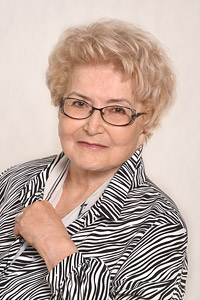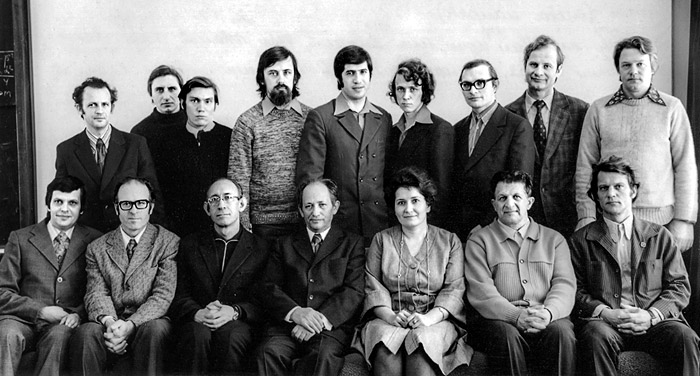
Electronic english version since 2022 |
The newspaper was founded in November 1957
| |
INTERVIEW for the issue
From laboratory assistant to advisor to director
The Dzhelepov Prize was established at JINR in 2010. It is awarded for outstanding achievements in the field of experimental and theoretical research aimed at meeting applied problems using nuclear physics methods. This year, as was announced at the 136th session of the JINR Scientific Council, the winner of the Prize was Marina Frontasyeva, PhD in Physics and Mathematics, Advisor to FLNP Director.
 The first question is about Venedikt Petrovich. Was there any memorable contact with him?
The first question is about Venedikt Petrovich. Was there any memorable contact with him?
- I'll start with the fact that in my work record book there is only one entry that was made when I started working at DLNP - "Joint Institute for Nuclear Research". I defended my thesis there, but at that time, it was difficult to find a job at DLNP. And specialists were needed in V.M.Nazarov's Sector at FLNP and I went to work for him. And then, some conference was going on, I was giving a big report. Venedikt Petrovich was sitting in the front row, writing something down. After the speech, he came up to me, praised my performance and exclaimed: "How could I have missed you?!" He regretted that I had moved to another laboratory.
I studied at the Department of Theoretical and Experimental Nuclear Physics of the Physics Department of Saratov State University. During the Great Patriotic War, Dmitry I.Blokhintsev worked at our university and my thesis supervisor Professor A.S.Shekhter was his graduate student at that time. In 1970, I came to Dubna with a large group of students from Saratov University, A.S.Shekhter came with us, we listened to D.I.Blokhintsev's lectures. And later, we invited everyone to our house, not only my fellow students came, but also the Institute staff - graduates of our university, Dmitry Ivanovich came, too. It was an unforgettable meeting.

Meeting of graduates of Saratov State University - JINR employees with teachers of the Physics Department of SSU in Dubna.
1977.
Who else can you call your teachers in a broad sense?
- My research paper at FLNP was supervised by Yury Popov and a Slovak employee Matej Florek, who we began a long-term collaboration with in the field of neutron activation analysis (NAA) in the late 1990s. I worked for a long time with Vladimir Nazarov, an enthusiast of NAA. We met with G.N.Flerov more than once; he was interested in the development of environmental research at JINR. The research of our NAA and Applied Research Sector extends not only to life sciences - biomonitoring of air and water ecosystems, geology, space, anthropology, food research, but also to materials science: bionanotechnology, analysis of new materials, in particular, synthetic diamonds. The peak of our activity came in the last pre-pandemic years, when the Sector's research was supported by 18 grants from the Plenipotentiary Representatives of the Governments of the JINR Member States and Associate Members that indicates a great interest in applied research at our Institute. We have been participating in IAEA programmes for 30 years. The pinnacle of our activities was the coordination of work on the UN Commission on European Air Pollution programme within the UN Convention on Long-Range Transboundary Air Pollution that was transferred to JINR in 2014. About 40 countries participate in the programme that provided their data to special software developed on the JINR cloud platform by MLIT employee Alexander Uzhinsky. The significance of this air quality monitoring programme is extremely high. The environmental safety doctrines of all countries begin with air safety and by addressing these issues, we meet important social problems. In 2023, for obvious reasons, coordination of this programme was transferred to France.
Young people have always extensively been worked with in our Sector, we have welcomed and currently welcome students during summer and other international student practices and schools. The subject of our Sector is popular, there is even a competition to get an internship with us.
Yes, your Sector always has graduate and postgraduate students from different countries, it is the most international...
- We can say that we have always been an international centre within an international Institute, over the years, representatives of many countries have worked or completed an internship with us. All these years, we have had employees from Georgia. Our colleague from the Institute of Physics in Tbilisi Liguri Mosulishvili has recalled that Dubna helped them to survive when the research reactor in Georgia was shut down. With the arrival of Elena Kirkesali, a new wave of research started in our Sector - bionanotechnology that is successfully developed by Inga Zinkovskaya. This is the cutting edge of science. I am glad that the Sector currently shows no loss of interest in ecology or materials science and medical aspects related to the investigation of the elemental composition of biosubstrates also develop.
Your research area has also included space.
- Yes, with the coming of Professor Richard Hoover (USA) to the Sector of Astrobiology at LRB, we began studying meteorites and extraterrestrial matter. Last year, two papers from this series were awarded the JINR Prize. Today, we have prepared a new good paper related to cosmic dust in the Arctic, together with V. A. Tselmovich, an employee of the Borok Geophysical Observatory, a RAS branch of O.Yu.Shmidt. In the summer of 2022, I dared to go to the Arctic on the expedition ship "Professor Molchanov", which 100 specialists and students from different universities of the country traveled on for 26 days in the Arctic Ocean around the Novaya Zemlya archipelago. I delivered reports in different countries of the world on all continents, but it was the Arctic that made a huge impression on me. When you stand on the deck, knowing that beneath you there is a depth of many kilometers and above your head there is a bottomless sky, you feel like a part of the Cosmos.
Which of your lectures do you remember best?
- Probably, in South Africa, at iThemba LABS. I was amazed by the Accelerator Centre territory itself with wild exotic animals freely moving around it. Of course, there were no predators there, but we saw zebras and antelopes. Yes, in general, it can be said that the most striking lectures were in South Africa. And our grandiose project on studying the aquatic ecosystems of the southern tip of the African continent with the investigation of the elemental composition of bivalve mollusks was held there having grown out of cooperation with Stellenbosch University that started in 2012. Thanks to the enthusiasm of our project partner Dr. Jacques Bezuedenot, we obtained mollusks from the coast of Mozambique, South Africa, Namibia and Angola and with the help of the NAA at the IBR-2 reactor, we estimated the ecological state of the entire southern coast of Africa. No one had done it before us.
You are the author and co-author of more than 550 publications and two patents.
- Yes, we have published the results of our numerous investigations in the form of scientific articles, atlases of heavy metal pollution in a number of European countries, contributed chapters to papers on nuclear physics research and became the authors of two patents of the Russian Federation for invention. As for my international recognition, last year, according to the rating of the leading scientific platform Research.com that is determined based on the number of specialized scientific publications and citations, I entered the top ten scientists in Russia in the field of environmental sciences. I am a member of the editorial boards of several international scientific journals, among which The Science of the Total Environment (1989-1997), Ecological Chemistry and Engineering, Journal of Marine Science are. Of course, reviewing articles takes a lot of time, but it also allows you to learn about new papers.
You have been passing on your experience and knowledge to the youth for a long time.
- Under my supervision, 12 PhD theses have been completed by employees from JINR Member States. Among the dissertators, we can name JINR employees Otilia Culicov and Inga Zinkovskaya that has already defended her PhD thesis.
Do you follow the fate of your dissertators?
- Of course. And not only their scientific results. I went to someone's wedding, became a godmother for someone's children and recently, I have prepared a letter of recommendation for "our Zina", my beloved Ntombizikona Ndlovu from South Africa, for her to apply for a job at the University of Cape Town. Even now, they have turned to me from Poland for a recommendation for the thesis of an employee that once worked for us. It seems to me that science has always been above politics and good human relations are maintained, despite the difficult political situation.
What do you think is the main quality an experimental researcher should have?
- Interest and following through. I have this trait - every completed paper should be brought to publication.
It was news to me that you have worked as Scientific Secretary of the Scientific Council of the Russian Academy of Sciences on Applied Nuclear Physics for 17 years without a break.
- Chairman of this Council for a long time has been Yu.Ts.Oganessian and I was recommended for the position of Secretary by Corresponding Member of the USSR Academy of Sciences V.I.Mostovoy. It was a great honor for me, very interesting people gathered there. For some time, I was the Secretary of the RAS Council on Cosmic Dust that unfortunately, stopped functioning.
For many years, you have been leader of numerous international projects coordinated by the IAEA and the framework programmes of the European Union, the UN.
- At present, I am leader of the IAEA programme for the Black Sea and I am the coordinator of the Russian scientific collaboration that includes the Geological Institute of the Russian Academy of Sciences and the Institute of Oceanology of the Russian Academy of Sciences. Samples for analysis from the Russian coast of the Black Sea are supplied to us by an employee of the Institute of Oceanology Professor A.N.Kamnev, a continuer of the ideas of V.I.Vernadsky. We are very lucky with collaborators! Of course, the support of Directorate of our laboratory is extremely important. I take this opportunity to express my deep gratitude to FLNP Directors Viktor Aksenov and Valery Shvetsov, for their constant concern and interest in what we were engaged. Aksenov once said: "I am pleased to help you, for I see the result!" What could be more valuable than such estimation?!
Post scriptum
Marina Frontasyeva participates in the work of the Moscow Space Club, in the section "Problems of space thinking and living ethics". She was invited to the Club by an employee of the GAISh MSU L.M.Gindilis that had long been interested in the problem of extraterrestrial intelligence and was engaged in metascience. And her most recent passion is the ideas of quantum biology. "Science gives a feeling that you mean something, that you do something useful for people," Marina Frontasyeva believes. "Based on the results of our work, measures are taken somewhere to improve the quality of life. If it were not for this air quality control programme, I probably would not have had such a feeling. I think Venedikt Petrovich would be pleased that I was awarded the Prize named after him."
Olga TARANTINA
photo by Vera KORENSKOVA and from the archive of M.V.FRONTASYEVA